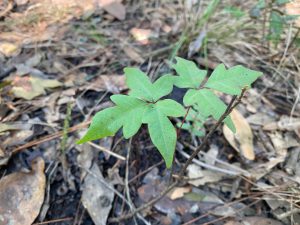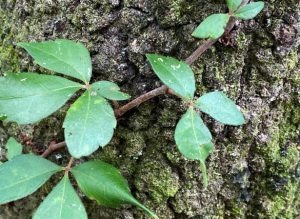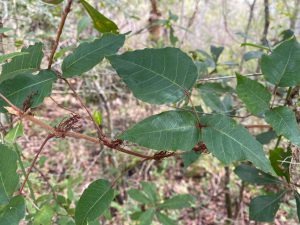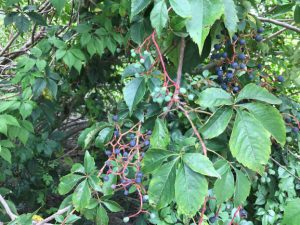Florida is home to many native plants and knowing what plant you are looking at isn’t always easy. Today, we are going to focus on just two, similar looking, native, vining plants: poison ivy and Virginia creeper. Why these two species? Let’s find out!
Have you heard the saying “leaves of three, let it be; leaves of five, let it thrive”?
Let’s look at the leaves of poison ivy first. Their leaves consist of three leaflets. These leaflets, along with the rest of the plant, contain an oil that causes irritation if touched. That is why you want to “let it be.”

Virginia creeper, is similar in appearance, but their leaves usually have five leaflets. You can find this vine to have leaves containing only three or four leaflets. When Virginia creeper is seen with only three leaflets, it can look very similar to poison ivy. If you’re unsure which species you have, take a closer look at the stem of the plant.

The way these vines “climb” is unique, and another way you can tell them apart. Poison ivy climbs and attaches to surfaces by hair-like roots. Virginia creeper climbs using thread-like structures called tendrils that spiral around points of support. If you look closely at the ends of tendrils of Virginia creeper, they have these really cool suction cup-like structures to aid in grasping and climbing.


The way these plants affix themselves to structures to vine is different enough to tell the two species apart, but one more observation you can make is to look at the fruit (if available). The fruiting bodies of these plants are very different from one another. Poison ivy produces small greenish-white berries while Virginia creeper produces larger, dark bluish-purple berries, similar in appearance to a small grape.


Summary
To help you identify these plant species if you encounter them, take note of:
- The number of leaflets (remember “leaves of three, let it be”)
- The way in which the vines “climb”
- The fruit (if in season)
Hopefully with these helpful key notes, you will be able to identify the difference between poison ivy and Virginia creeper. If you’re still unsure, but curious to know, take a picture and send it to me at lara317@ufl.edu.
You can learn more about these comparisons in our "This or That?" video. Curious about other species comparisons? Check out our full blog series on commonly confused species or purchase a copy of our field guide.
 0
0
